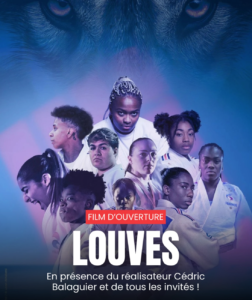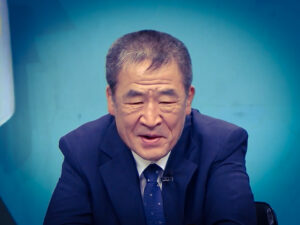Born on June 26, 1994 in Montreal (Canada), Catherine Beauchemin-Pinard has become over the seasons, with her Olympic bronze in 2021, her two World finals in 2022 and 2025 and her nine podiums since 2015 at the Pan American Championships and Games, one of the leaders of the tremendous generation of Canadian judokas who emerged in the wake of the pivotal bronze obtained at the 2012 Olympics by Antoine Valois-Fortier, the former U81kg who became coach. World No. 1 in the U57kg category at twenty years old, world No. 1 in the U63kg category at thirty, she confirms the solidity of the system structured over the years by Nicolas Gill and many others around him. “What inspires me most about Catherine is her fighting spirit and her attitude,” says her teammate François Gauthier-Drapeau, winner of the 2025 Paris Grand Slam. “She fights by giving everything she has and, as soon as she gets on the ground, she keeps giving it even if it tires her out and makes her suffer. She’s a judoka with many strings to her bow and, against the strongest opponents, she pulls out all the stops. I think it comes from her instinct for fighting and I’m even a little jealous sometimes. On top of all that, I’d say she’s a training machine. She’s been on the tour for I don’t know how many years and, even today, at an age when many are hanging up their skates, she continues to push the machine and deliver historic performances. I think she really loves the world of judo.” » It’s this inner fire, which his consistency suggests, that we decided to talk about together, to discover a familiar yet not-known-enough figure on the tour. A puzzle-like figure with a curriculum full of seemingly minor contributions, entirely dedicated to a judo in G(round) major. – JudoAKD#038.
A French version of this interview is available here.
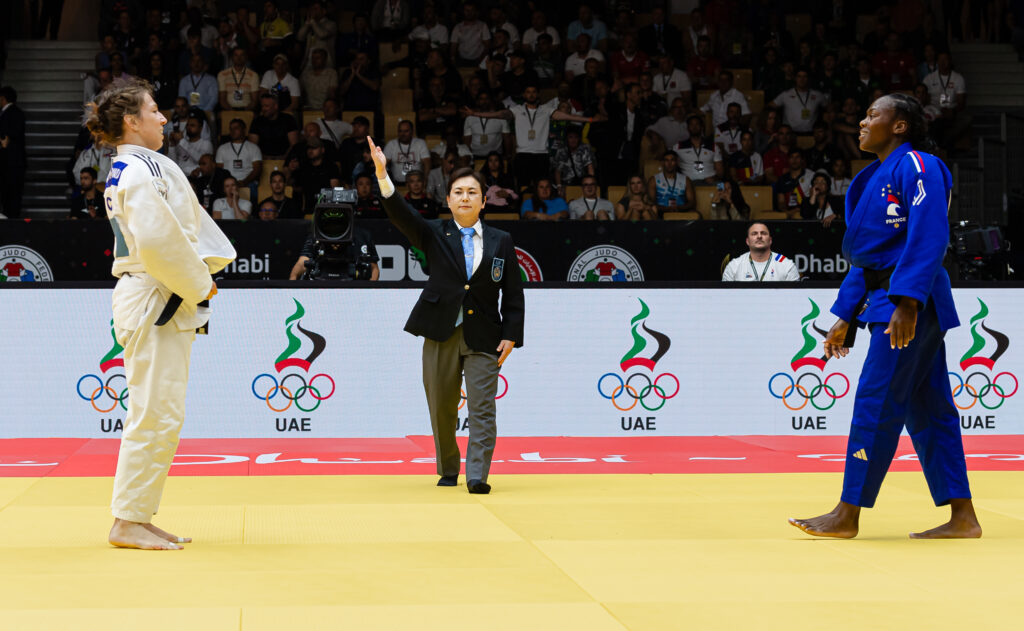
In the quarterfinals of the Abu Dhabi World Championships in May 2024 and then in the semifinals of the Tbilisi Grand Slam in March 2025, you became only the third U63kg athlete in the last twelve years (along with Kosovar Laura Fazliu in 2023 and Slovenian Tina Trstenjak between 2015 and 2017) to beat France’s Clarisse Agbégnénou at least twice in a row, despite the latter having systematically dominated you until then.
The fights between Clarisse and me have always been quite close. Our first encounter was in Cape Town, South Africa, at the 2011 Junior World Championships—that was a while ago! I competed in the U63kg category there before moving back down to U57kg. I was leading the fight with a shido advantage early on and thought I could win that way, but she eventually managed to throw me…
Do you think you’ve found the key against the woman almost the entire category has been struggling against for the past three Olympics?
I think I’ve always had a style that troubles her, or at least one she finds difficult to deal with… [She reflects] You know, with each opponent I face, I try to depersonalize it a bit, to focus on the facts, or at least on what I can do to win the fight—the techniques, all that. I also study a lot of video footage before fights, especially when I know I’m likely to face her. During training, I take notes on the side about what works and what doesn’t work so well… I think all of that combined, over the years, has allowed me to perform well in our last two encounters. In any case, I had the right mentality for it.
Your former teammate turned coach, Olympic and World medalist Antoine Valois-Fortier, explained to me that he had worked with a Japanese sparring partner in the lead-up to the Rio Olympics. This fighter had the same body type as Loïc Pietri, one of his main rivals at the time. And it turned out that in the first round of the Olympics, Antoine drew Loïc and managed to eliminate him. Have you ever had the opportunity to have that kind of training partner?
No, but that’s definitely something we do a lot in Canada. For example, for this year’s World Championships in Budapest, we’re bringing in a Japanese fighter and, in my case, an U63kg athlete, Momo Tatsukawa, who already has several Grand Slam medals. Another Japanese fighter arrived before the Olympics and I think he really wants to stay in Canada. The strategy in Canada is to regularly bring in Japanese men and women to have that type of opposition in training ahead of the Olympics or World Championships. And when these training partners want to stay, it’s ideal for us. For me, this is a first. I have a Canadian training partner I train with every day in Montreal, Laurence Biron. She competed at the Pan Americans and I hope she’ll be able to compete at the World Championships soon.
You mentioned the 2011 Junior World Championships and your first encounter with Clarisse. At the end of 2013, I had written about Margaux Pinot who was also breaking into the category. Bruno Douet, Margaux’s first coach, told me that those 2011 World Championships had shown him something unexpected about Clarisse—her emotion when she won the bronze medal at those junior Worlds. It had struck him because Clarisse already had senior results, notably that title at eighteen at the prestigious Tokyo Grand Slam. For him, the junior podium in Cape Town was almost as important for Clarisse, precisely because it was at junior level. There was this notion of not skipping steps… You also started performing at senior level while you were still a junior. Was it important for you too to finish well your junior years?
Yes, I remember that when I won my first medal at the junior World Championships in 2013, I was already starting to compete in senior Continental cups in South America. At that time, I was also beginning to compete in Grand Slams, but I hadn’t yet achieved results at the level of that first junior World medal. And then in 2014 I beat American Marti Malloy twice… Marti was an Olympic podium finisher in 2012 and a World Championship finalist in 2013. It was solid.
Yes, I was following Marti that summer and it’s true that your name quickly came up in conversation…
It didn’t happen overnight, but I started achieving big results really all of a sudden. I won a World Cup, a Grand Prix, then a Grand Slam back-to-back within a month, across three continents no less. Then I competed at the senior World Championships in Chelyabinsk and it really didn’t go well [defeated in the first round by Bulgaria’s Ilieva, editor’s note]. It was a huge disappointment. Fortunately, the junior World Championships in Fort Lauderdale, Florida, which took place right after, allowed me to bounce back from that defeat. I finished third there and it was a way to close the chapter on my junior years. And then focus on Olympic qualification.
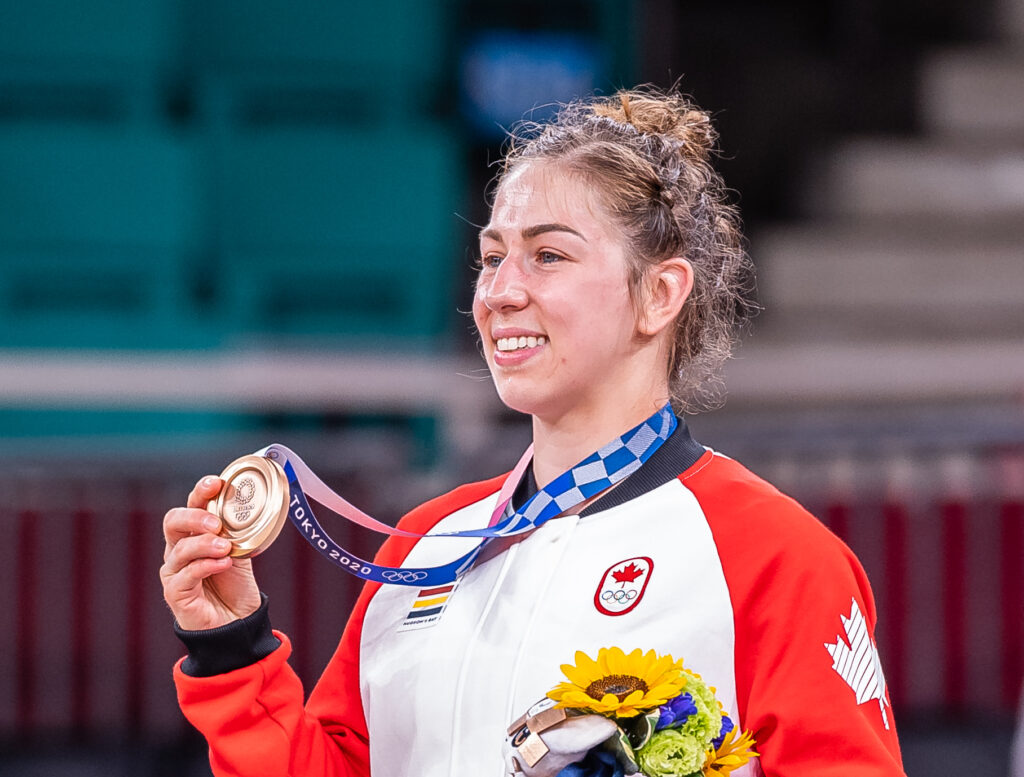
Looking at the stats from that era, there’s that first fight against Clarisse in 2011, but you also beat Christa Deguchi during those junior years. Tricky question: what makes it so that at one point, you beat people as a junior and then later, those same people overtake you on the senior tour? Aren’t the truths of juniors necessarily the same as those of seniors? What determines these trajectories? Is it a matter of maturation?
You know, I’ve seen a bunch of people who became cadet World champions or were really strong as juniors and then, when they reached senior level, got a bit big-headed [laughs]… It must also be said that there’s a paradox in winning a lot when you’re young…
Which is?
It’s simple to say but winning everytime doesn’t teach you how to lose. Yet knowing how to lose is a really important skill in judo. Learning to lose is learning to overcome defeat, right after. When you win everything when you’re young, I find that afterwards, it’s harder in the long term… And even then, there are nuances depending on the level.
Meaning?
There are people for whom finishing third or second at the World Championships is a failure. Others for whom winning any medal or even just making the Top 7 at the same level is a victory. It all depends on your level, how you see it and how you see yourself… All of this to say that being able to pick yourself up after defeats really helps in the long term.
Do you remember fights that generated major soul-searching afterwards? At the 2014 World Championships in Chelyabinsk, I was sitting in the stands with Antoine and you weren’t far from us. He told me you were taking it hard…
That’s true. But was it to the point of making me reconsider everything? I’d say I was mainly disappointed. After that, I just adjusted a bit for what came next, because it was really my first big fall. I had climbed really high, with three competitions won consecutively in El Salvador, Mongolia and Russia. That had generated new expectations from others. I was still ranked first in the world going into those championships. Everyone was convinced I was going to perform well. The big lesson from those championships was that: learning to manage others’ expectations. Managing to put them aside to really focus on what’s important to me when I prepare for a competition.
Were there other moments of introspection like that one?
Yes, during my final period in U57kg, before moving up to U63kg. I had had many poor performances that made me realize I needed to move up a weight category, because I was no longer performing at the level I was capable of performing at.
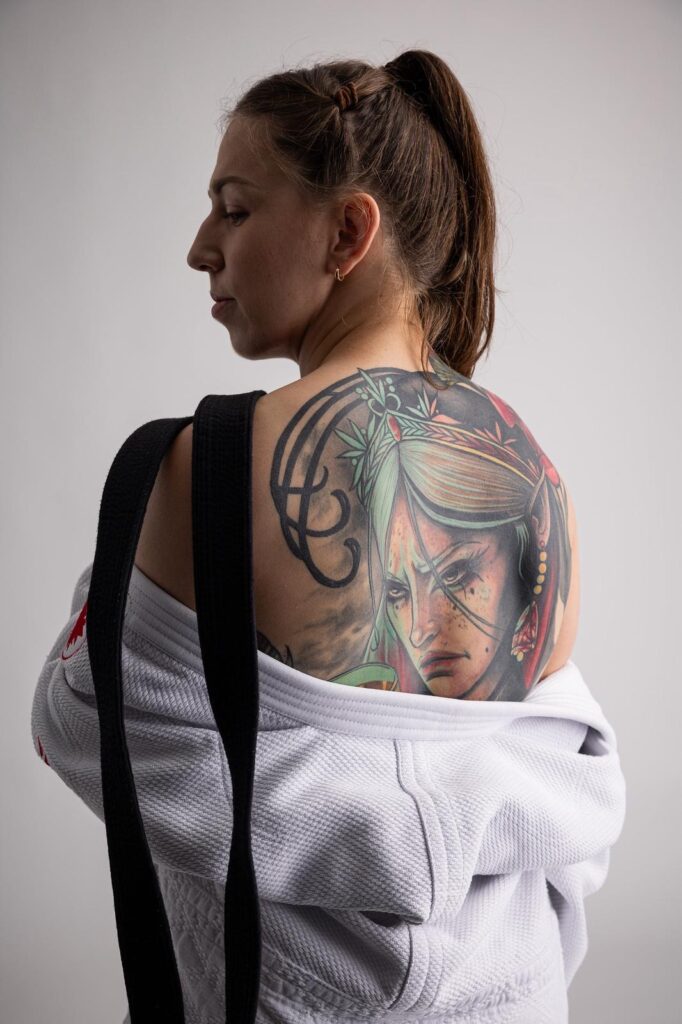
You were twenty-two when you decided to move up to the U63kg category. That was after the Rio Olympics. Weight was an issue for you, if I remember correctly…
But actually, I even wrote a book about it, you know [smile].
Oh really? Sorry, that went under my radar. Did it come out recently?
Just before the Paris Olympics. It tells the story of my relationship with food and the problems I had to manage on that front. I actually gave it to Clarisse just before the Georgia Grand Slam where we faced each other last March. She had asked me for it and I decided to dedicate it and give it to her at the training camp in Nymburk in the Czech Republic… Regarding weight management, before the Rio Olympics, it was fine. It really started after the Rio Games. I was beaten in the first round by Hungarian Hedvig Karakas. That was still a big disappointment. After that, everything exploded weight-wise. I was partying a lot. I had also postponed a lot of things until after the Olympics. Result: I gained ten kilos in two or three months.
Oh really? You’re not kidding. When you go up, you go up!
I was at 57, then I was 68 after the Olympics. And then I decided I wanted to go back down to 57. I spent six months trying to make 57, but it wasn’t very good. Normally, I generally try to take my weight loss down slowly. The problem is that there was Christmas in between [laughs]. Eventually, I put all the weight back on… The goal was to compete at the summer 2017 World Championships in the U57kg. Before that, there was the Grand Slam in Paris in February.
Complicated?
I remember, I came back from Christmas, and actually I was back to square one. I was back to 67, 68 kg. But I still managed, in one month, to lose everything to be in the U57kg category in Paris. After that, it was a lot of yo-yoing, a lot of dehydration, to the point where I decided to make an appointment with a psychologist specializing in nutrition. She’s the one who made me realize that I couldn’t compete in U57kg anymore. I still remember, I walk into her office and I say that I would like this: to be happy competing in U57kg. And she tells me: I don’t think that’s possible. We then discussed the pros and cons of both possibilities.
What were the arguments in the balance?
The big point against my move up to the U63kg category is just that I was afraid of change. You know, I was really used to 57. I knew all the girls. I knew how to beat them. I had my plans against each of them. I had my routine. In short, U57kg was comfort for me. U63kg, on the other hand, is a bit of the unknown. Moving up also means I have to prove myself again in U63kg. And proving myself starts at the Canadian level, to get funding for competitions, etc. All of that was what prevented me from changing initially.
Does your book also cover your journey?
Yes, it covers my beginnings. What I did, how I developed eating problems through weight cuts, all of that. It’s more to raise awareness about being careful not to repeat the same mistakes. I really try to teach a healthy way to lose weight, without repeating all the mistakes I made myself, actually.
Meaning?
Being able to have all foods without deprivation, not having forbidden foods. I can also do nutrition: explain what micronutrients and macronutrients are, what a high-level athlete eats, what you should eat during the day, what a balanced plate looks like, how you should reduce your plates, your portions, what you should start cutting first, carbohydrates, all that. I also explain how I lose my weight at the end, how to manage dehydration, how to do it in a way that makes sense… And I repeat it every time: each person is different. Each person has their level of tolerance, their way of hydrating, their way of losing weight, etc. It’s up to you to find your magic recipe. The goal is not to make weight, but to perform the next day. There are about fifty recipes at the end. And very beautiful photos [smile].
You’ve acquired solid nutrition skills throughout your career, I see.
If I had to do it again, maybe I would have studied nutrition, yes. Food is a topic that interests me a lot. And I like cooking in general even though I have little time to do it…
Belgian Amélie Rosseneu had written a book on this topic a few years ago, too. She was a coach in Israel, before specializing in dietetics precisely… In France, the U52kg Amandine Buchard notoriously had a first part of her career undermined by this dieting issue…
Yes, I saw her in competition, I knew some details… For her, it was really at another level. She really scared herself. And now you’ve seen that she’s taken on a double challenge?
Yes, the topic was extensively covered in French media…
Isn’t she putting a lot of pressure on herself? That’s a lot of things to manage. I admit, two high-level things like that, it’s impressive.
Voir cette publication sur Instagram
Une publication partagée par Catherine Beauchemin-Pinard (@cbeaucheminpinard)
Changing weight categories also reshuffles the cards of internal competition in a national team. In the U63kg category, the other Canadian at the time was Stéfanie Tremblay. How did you deal with this new rivalry?
There are always little clashes that can happen here and there. It’s understandable. Until the middle of the Rio cycle, we were both in the U57kg category. And since I had taken a big lead in the 2014 season, she had also tried to give it a shot in U63kg for the Rio Olympics. Obviously, when I changed weight categories again to move up to U63kg myself, it surely affected her a bit.
Especially, as you say, since there’s the question of funding that comes up…
Exactly. I moved up definitely in the fall of 2017, just after the Budapest World Championships. The results came quite quickly, which allowed me to secure the funding, and I completely understand that it affected her. We all fight to make the Olympics and, when you look at Jessica and Christa for example, it’s heartbreaking. You know, even though we’re a team, in the end there’s only one person per category who can go to the Olympics. It’s difficult for that reason, and yet we’re not a super big team compared to other countries like France or Japan, where there are really a lot of rivalries. At the same time, maybe having rivalries like that is really not bad. It helps raise the level of each career. I think for example that it’s not for nothing that Christa and Jessica are the two best U57s in the world. Neither one had a choice. Each had to be at her best to go to the Olympics. And being better than the other pushed them to become better than all the others – and therefore to be the two best in the world in the U57kg category.
By the way, as we speak, Jessica has only competed once since her podium at the Abu Dhabi World Championships in May 2024. That was at the Baku Grand Slam in February 2025, and she finished second there in… U63kg. Is this temporary or does she want to stay in U63?
She wants to stay.
That creates another rivalry for you!
Yes, and it’s a good rivalry, once again… Actually the real question for me today is: am I going to compete at the next Olympics? It’s still really far away and I have a big doubt today about my willingness to go that far.
Oh really?
I’m telling you this and at the same time, if we’re both in rivalry for Los Angeles, we’re going to fight as hard as we can and then it will be « may the best woman win ». Because we both know: if we hold back and we’re always thinking about each other, we won’t help each other become better. What makes us strong is when, for example, in training camp, one of us will fight against a newcomer to the U63kg category and she’d tell the other afterwards how the girl gave her a hard time, all that. Exchanging advice, impressions, understanding how the other places her hands… If it’s me I’d tell her I approach that girl like this, or I did that to her too… That’s how I see it anyway.
It’s very much « mutual aid and prosperity »… What about the coaches? How do they position themselves in this scenario?
Of course when we end up fighting against a compatriot in competition, they don’t go to the coaching chairs and they don’t take sides. Speaking of which, I had a good discussion recently with Janusz [Pawlowski, Olympic and world medalist in U65kg for Poland between 1979 and 1988, now a member of Judo Canada’s staff, editor’s note]. It was at the Georgia Grand Slam last March. There was a possibility that Jessica and I would meet during the day. I talked to Janusz about it and he just told me: « You know Cath, I just love good judo. If you’re capable of putting on a good show, doing good judo, then may the best woman win and I’ll be happy. » And he added: « After that, you know, if Jess makes mistakes, if you make mistakes, then we’ll talk about it all together, and then we’ll correct those mistakes. It’s as simple as that. »
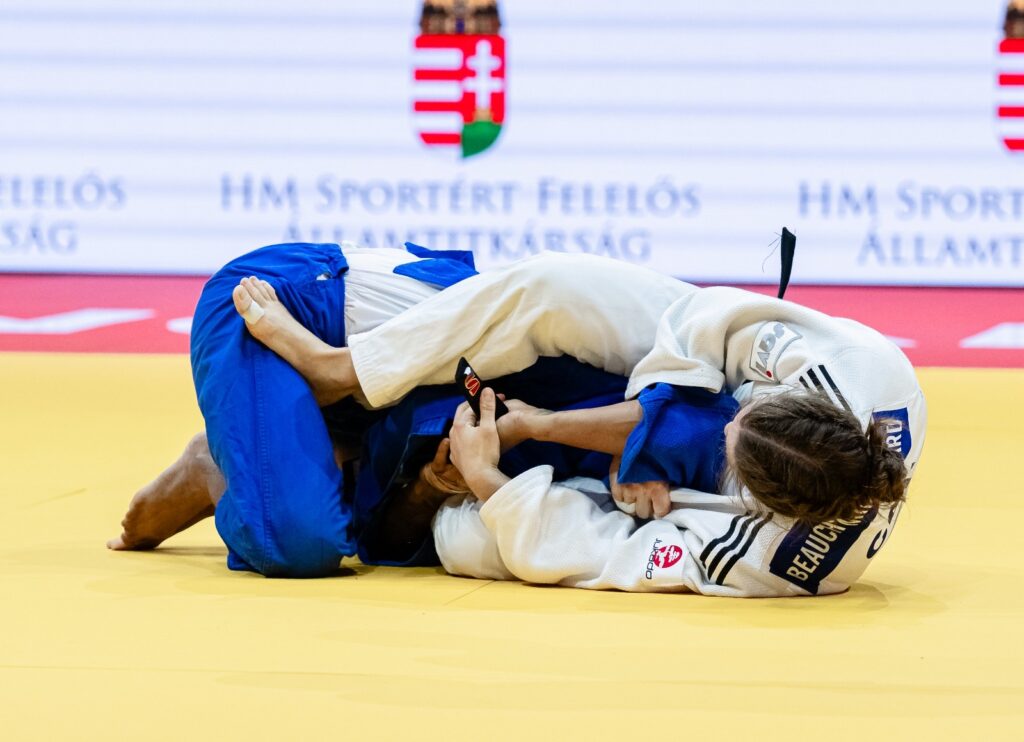
Are you from a family of judokas?
Actually, I was the least athletic in my family. We were three children. My brother and sister are older than me, we each have a year difference. We were a rather athletic family in general. We would go cycling, we went out a lot. Being the youngest, I was also the one who dragged behind, actually. My parents really wanted to sign us up for a sport. My brother did taekwondo, my sister played soccer, and I tried lots of things. I tried dance – I was terrible at it –, trampoline, soccer – I picked dandelions on the field… Nothing really appealed to me. And then one day, I did a reading about Nicolas Gill in elementary school. It was a text we had to analyze. I was nine years old, and he said in the text how he had gotten the bug for judo. For my part, I was searching a bit, I hadn’t yet found the sport that was going to fit me. That evening, I told my parents: « Mom, Dad, I want to do judo. I want to get the bug for judo. » That’s kind of how I started. Until then, I was more inclined toward the artistic. My parents would never have bet on me to go to the Olympic Games. But I have a hard head, that’s more what helped.
Over the years, you’ve become one of the best groundwork specialists on the tour. Has that always been a weapon in your judo?
Yes, I’ve really always been strong on the ground, even back when I was doing the Canadian championships. I’m lucky to have had a club coach for over twenty years who makes me do a lot of it. It’s Frédéric Feréal, he comes from the French club of Saint-Nazaire, which did a lot of exchanges with my club in Saint-Hubert. That’s how he met Marisol Laroche, his wife, and came to settle in Canada. Both of them work a lot on the ground. They gave me good foundations that I continued to improve when I went full-time at the National Center.
Who did you work with when you arrived at the National Center?
With Marie-Hélène Chisholm, who had finished fifth in the U63kg category at the Athens Olympics in 2004. She’s someone very strong in ne waza, who made us do a lot of ground randoris. I actually incorporated her sankaku into one of the variations of mine.
And what you worked on in training, could you transpose it to competition?
Yes, from juniors I saw that it was a real asset. I told myself: if it doesn’t work standing up, at least I have that, and that’s always how I saw it. Besides, when I teach ne waza, I often repeat that « standing up, we have one way to win; on the ground, we have three. » Why not take advantage of it? Especially since it has the advantage of being less traumatic than standing up.
That’s kind of how Czech Lukas Krpalek sees things too. In an interview in Prague at the beginning of 2024 for the French weekly L’Équipe Magazine, he told me that there were so many ways to be penalized standing up, that the ground remained the best way to play it safe and unfold your sequence without too many bad surprises at the end…
I agree. After that, even starting from the ground, you also have to stay vigilant. Look at what happened to Clarisse this year in the European final against Czech Zachova…
That’s true. Although in that specific case I had the impression that she wanted to do too well and confused speed with haste…
Yes sometimes, you’re in the emotion, and then it goes very fast. Even when you have the experience that Clarisse has.
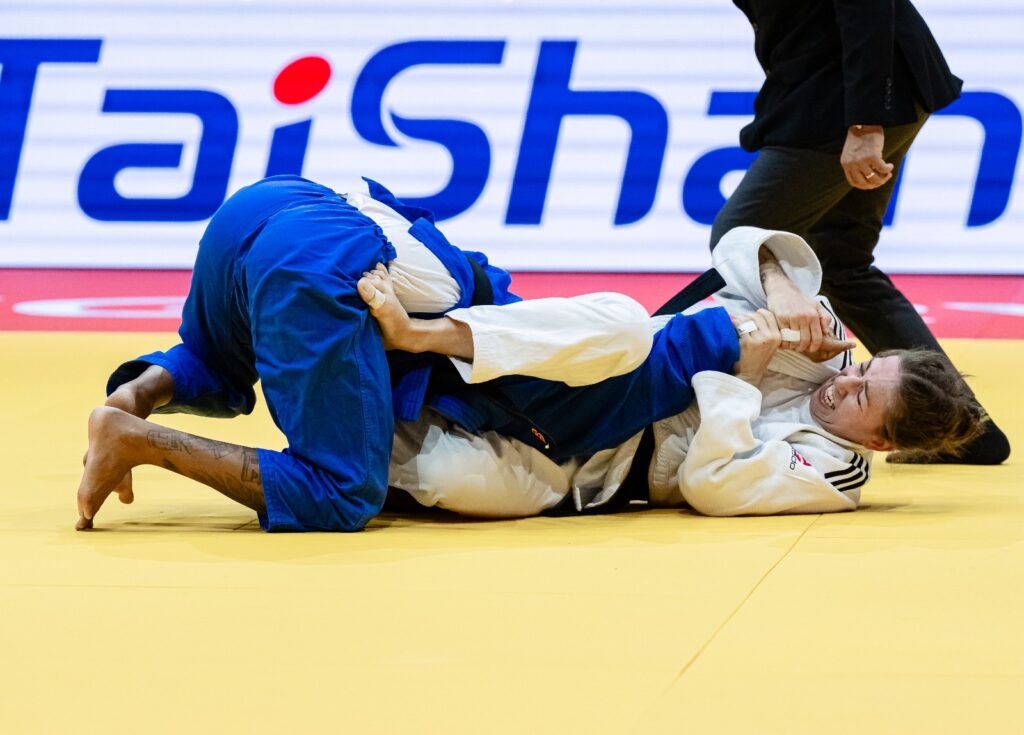
What you say about groundwork makes me think of Francis Clerget, the father of double world medalist Axel Clerget. He’s very well known for his groundwork and his children too. During an interview for L’Esprit du judo about ne waza, he told something that stuck with me. According to him, judo starts on the ground and ends standing up.
Oh really?
According to him, basically, the first ground sequence in a fight changes the power dynamic. At matte, one of the two will understand that the other is very strong on the ground and that it’s better not to go back there. When they return to standing, they’ll become a bit more nervous. So they’ll open up. And these openings wouldn’t have appeared so quickly if the other hadn’t created a feeling of concern due to their mastery of groundwork. You see the idea?
Yes, I see what you mean. I also observe that some flee the ground, and that this flight creates openings for me… What I like about groundwork is that when you’re like me, used to working in this area, you feel less fatigue in your leg muscles than those who haven’t developed this habit. It’s a way, I find, to tire out the other person. When I do a one-minute sequence on the ground, even if there’s no ippon at the end, I know it tired her out. Sometimes I even go longer, sequences of a minute and a half, just on the ground, without matte.
You talked about what you learned from your teachers in Saint-Hubert but also from Marie-Hélène Chisholm. Have you had other sources of inspiration since then to refine your ne waza?
I’ve taken a lot from different people over the years. Travis Stevens, for example. He came to the training camp in Montreal and, as is customary when we receive athletes from other clubs, he reveals one of his techniques. Since that moment, I started doing it too, and I must say it suits me well. In short, the more you practice, the more you learn, and the more your judo gets richer.
Are you one of those judokas who, like Polish Pawel Nastula, Dutch Mark Huizinga or Japanese Shori Hamada, never lose on the ground?
Uh, it happens to me, you know! I think the times I lose on the ground, it’s when my opponent finds really good transitions. For me, it’s advantageous to stay on the ground for a long time. That’s how I manage to trap people: when I get to the ground and we go to the armlock, then to the choke, the pin, and so on until the other gives up. In quick transitions, those where the other still has my arm for example, it can sometimes be more complicated. That’s what happened to me one day against French Manon Deketer. I have to be careful against profiles like that, who grab your arm and don’t let it go.
And the Japanese?
The Japanese are also very strong in this area, that’s clear. The one who changed her name, there…
Miku Tashiro, now Miku Takaichi?
That’s right. We met at the Tokyo Grand Slam in 2022 and she got me on the ground too. Besides, that year she won the competition and there were four Japanese on the podium!
In the U57kg category a few years ago, Olympic champion Kaori Matsumoto had made groundwork a central weapon in her strategy to tire out the other. She didn’t seem to necessarily seek to win on the ground, but she put such intensity into it that, when the referee announced matte, you saw the two girls getting dressed again and you saw that the other was often disheveled and no longer knew where she lived. Besides, it was often on the following sequence, standing or on the ground, that she made a mistake and the decision was made…
Yes, it’s true that she didn’t throw people that much. And given her track record, it’s clear that it was decided elsewhere. In my memories, she really had long fights, while being super fast and precise in her actions. We never faced each other in competition, though.
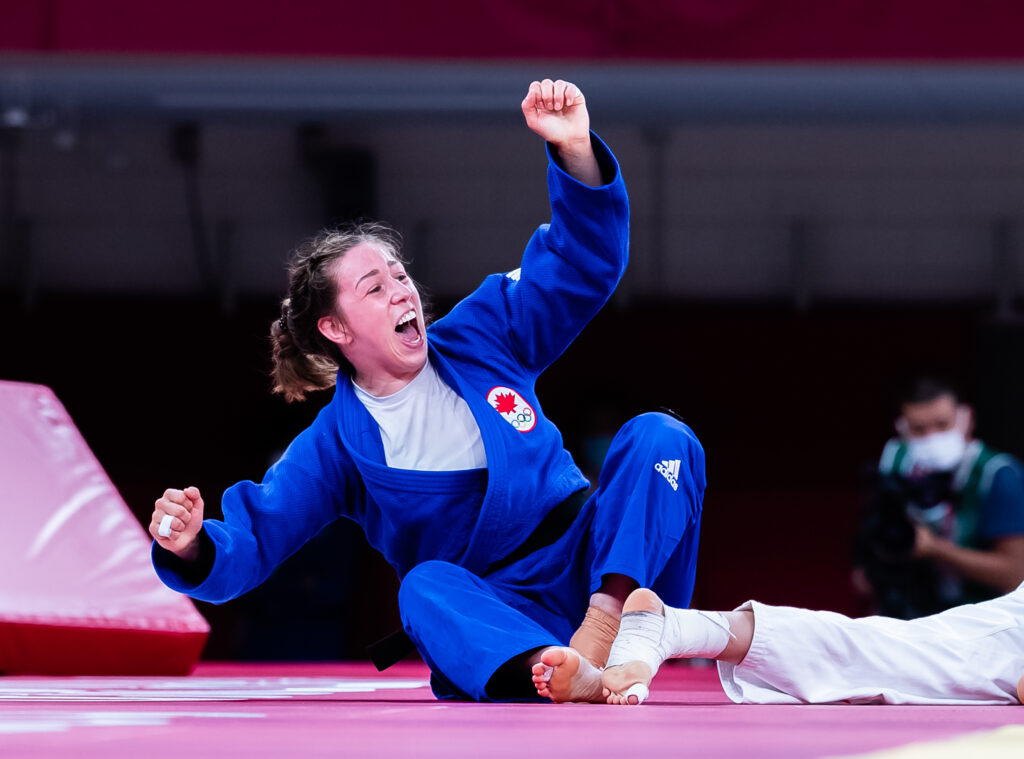
How did you deal with the lockdown period? I’m asking because you then went on to win an Olympic medal in 2021 and reach a World championship final in 2022, which suggests that this period was actually beneficial for you…
I think the lockdown was good for me, yes. It gave me an opportunity to rest. I’m usually someone who’s extremely busy. My schedule fills up quite quickly and I’m constantly juggling activities left and right. Throughout my entire career, one of my biggest challenges has been learning how to rest properly. The fact that this time I couldn’t see many people left me with no choice. I think it helped me to some degree, because on weekends, I really couldn’t do much of anything. All my focus was on judo and my recovery. I think that really made a difference.
And at the Team Canada level?
The group refocused on the athletes who were heading to the Olympics. We operated in small groups. I think it wasn’t a bad thing because the training sessions were truly personalized. Often, Jess and I would do more drills, for example.
What are drills?
They’re small judo circuits designed to build cardio through movements and lifts. You have a set time to complete them with your partner, taking turns. Janusz is the master of this exercise. He really knows how to torture us with it [smile].
Do you feel, now that you’ve passed thirty, that you’ve reached your full potential?
It’s clear that after my medal at the Tokyo Olympics, I wasn’t sure if I was going to continue until Paris. I had told Antoine: I’m going to go after that World medal I still haven’t won, which is why I prepared for Tashkent. And then, when I got to worlds, I actually won my medal. But that Olympic cycle was only three years. We were already in Olympic selection mode, and I found myself with a strong ranking to qualify for Paris. I didn’t want to regret not continuing with such a favorable starting position. Especially since this result showed I still had the potential to go after another Olympic medal. That’s essentially how I decided to continue until Paris. I was telling myself, not that it’s just a bonus, but that as long as I’m enjoying myself and still love my sport, I’ll keep going. I’ve always approached it that way. And that’s one of the reasons I’m still continuing. I love training. I love judo, I still get pleasure from doing it. For now.
At the Paris Olympics you finished seventh…
I was also hoping to win my medal in Paris like I had in Tokyo. But I injured my left hand during training a week before the Olympics. In Paris, I competed with a broken hand, though I only discovered this after getting X-rays when I returned to Canada.
Is that one of the reasons you say you’re not entirely sure about pushing through to Los Angeles?
I really take things one year at a time, because I have several parallel projects in my life. I studied Plastic Arts for three years between high school and university. I also completed a bachelor’s degree in accounting, then graduate studies in taxation, and now I want to get my CPA while working part-time about fifteen to twenty hours a week in taxation.
That’s quite unusual, indeed. And what’s CPA?
Chartered Professional Accountants… I plan to specialize in taxation and tax law. I’m thinking of doing my master’s in that field. Initially, I thought about doing research in sports, but now I’m considering doing it in international taxation instead. That really interests me. And you’re probably thinking: why not combine everything and do research in international taxation for athletes? I’ll admit I’ve considered it.
Do you think you’ll keep a foot in judo after your competitive career?
Yes, I’d like to. Alongside my extended studies, I’ve started taking coaching lessons. I still need to pass the final exam. I want to coach, but I don’t know yet at what level: national, club level, international… Because I also feel drawn to completely stepping away from international judo to just focus on my club. Getting involved in competitions? Absolutely. That’s something I enjoy doing as well. I’ve been doing quite a bit of that lately to promote my book, and I love meeting young people. So I think I’ll stay involved in judo somehow, even though I don’t know exactly how yet.
The Budapest World Championships now have passed. You won your second silver medal at this level after the one in 2022, only losing in the final to Japan’s Haruka Kaju, who remained undefeated this season. What is the predominant feeling?
I’m happy with this new silver medal. I have no regrets because regrets are too easy. On the contrary: I had injured my right knee ACL five weeks before the worlds. I’m already happy to have been able to compete.
You once again showed great qualities on the ground until the final where this time it was the Japanese fighter who managed to pin you…
I’m indeed confident on the ground. I’m not used to people coming after me in this area. The rare times I’ve had to give in were rather on transition sequences. From memory, the only ones who have dominated me in this exercise are France’s Manon Deketer, Japan’s Miku Takaichi and Britain’s Lucy Renshall… Haruka Kaju, who dominated me in the final in Budapest, is a newcomer. She arrived on the international tour last December at the Tokyo Grand Slam, which she won. She then won Paris and the Asian championships, before winning these worlds. The way she’s going, I think the Japanese staff will push her all the way to Los Angeles.
What’s your assessment of the Canadian team at these Worlds?
We only presented five fighters at these Worlds: Kelly Deguchi and Evelyn Beaton in U52kg, François Gauthier-Drapeau in U81kg, Kyle Reyes in U100kg, and me. It’s often like this in post-Olympic years. Jessica had an elbow injury, Arthur Margelidon wasn’t in the points yet, Christa taking a rest year. And we didn’t do the mixed teams – the only time we did them was in 2017 in Budapest and Kyle had to face all the big guys [smile]!
Here you are World #1 in U63kg, as you had been in U57kg at the beginning of your career. A great pride I imagine…
Yes, especially since in U63kg I’m less affected by weight cuts. And the results are there… Now I’m going to take a little rest then sit down soon with Antoine and take stock for what’s next.
What would the Catherine of 2025 say to the Catherine who was tying her very first white belt when she was nine years old?
When I look at my career, there’s not much I would change. Every thing I did, I learned something. The only thing I would say is what my coach always told me when I was young: have fun and keep smiling on the mat. Pressure? What’s the point? It’s kind of how I fell in love with judo. Judo for me is first and foremost games – not the Games, games, something playful, you know. It’s also a second family.
Are you able to share good moments with your rivals?
Yes for me, when it’s on the mat, it’s one thing, and outside, it’s something else. There are fights I love doing in training camp, with Clarisse or with Andreja Leski for example. I have fun when we train together, despite our rivalry in competition. And then you know, I often smile when I fight certain girls, because there are things I find funny. There are things I try to do, others I miss. So what? Having fun, smiling, that’s mainly what’s important. – Interview conducted by Anthony Diao, spring-summer 2025. Opening picture: ©Paco Lozano/JudoAKD.
A French version of this interview is available here.
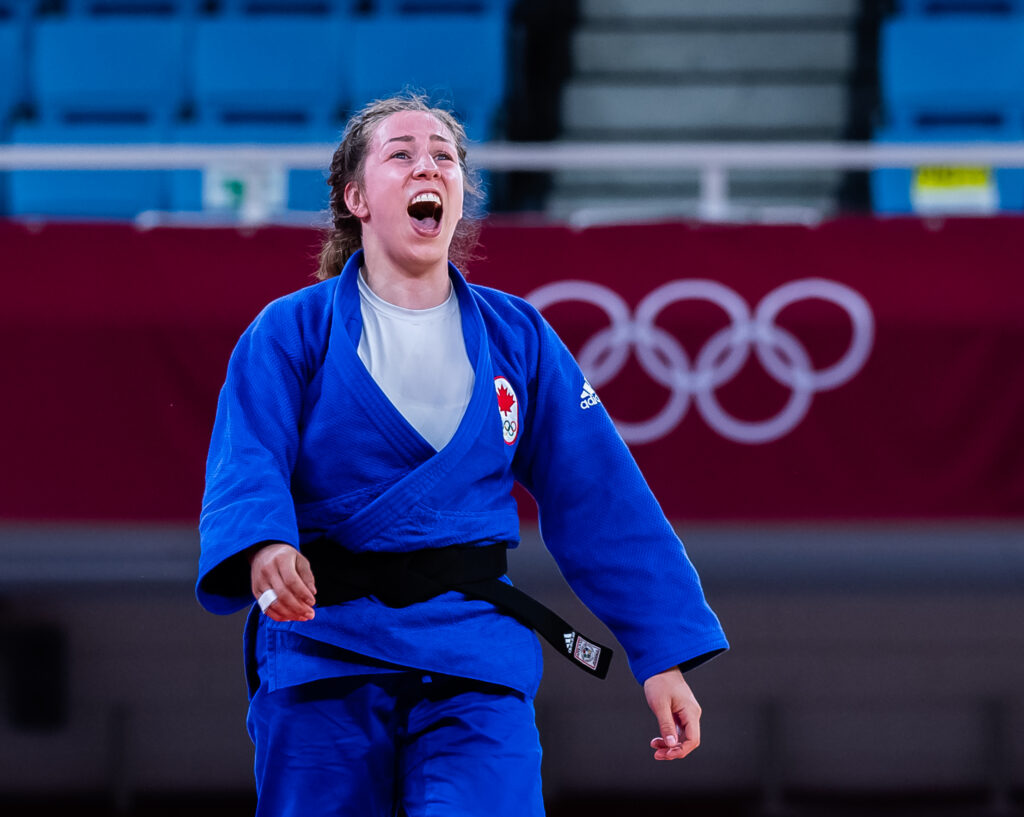
More articles in English:
-
- JudoAKD#001 – Loïc Pietri – Pardon His French
- JudoAKD#002 – Emmanuelle Payet – This Island Within Herself
- JudoAKD#003 – Laure-Cathy Valente – Lyon, Third Generation
- JudoAKD#004 – Back to Celje
- JudoAKD#005 – Kevin Cao – Where Silences Have the Floor
- JudoAKD#006 – Frédéric Lecanu – Voice on Way
- JudoAKD#008 – Annett Böhm – Life is Lives
- JudoAKD#009 – Abderahmane Diao – Infinity of Destinies
- JudoAKD#010 – Paco Lozano – Eye of the Fighters
- JudoAKD#011 – Hans Van Essen – Mister JudoInside
- JudoAKD#021 – Benjamin Axus – Still Standing
- JudoAKD#022 – Romain Valadier-Picard – The Fire Next Time
- JudoAKD#023 – Andreea Chitu – She Remembers
- JudoAKD#024 – Malin Wilson – Come. See. Conquer.
- JudoAKD#025 – Antoine Valois-Fortier – The Constant Gardener
- JudoAKD#026 – Amandine Buchard – Status and Liberty
- JudoAKD#027 – Norbert Littkopf (1944-2024), by Annett Boehm
- JudoAKD#028 – Raffaele Toniolo – Bardonecchia, with Family
- JudoAKD#029 – Riner, Krpalek, Tasoev – More than Three Men
- JudoAKD#030 – Christa Deguchi and Kyle Reyes – A Thin Red and White Line
- JudoAKD#031 – Jimmy Pedro – United State of Mind
- JudoAKD#032 – Christophe Massina – Twenty Years Later
- JudoAKD#033 – Teddy Riner/Valentin Houinato – Two Dojos, Two Moods
- JudoAKD#034 – Anne-Fatoumata M’Baïro – Of Time and a Lifetime
- JudoAKD#035 – Nigel Donohue – « Your Time is Your Greatest Asset »
- JudoAKD#036 – Ahcène Goudjil – In the Beginning was Teaching
- JudoAKD#037 – Toma Nikiforov – The Kalashnikiforov Years
- JudoAKD#039 – Vitalie Gligor – « The Road Takes the One Who Walks »
- JudoAKD#040 – Joan-Benjamin Gaba and Inal Tasoev – Mindset Matters
- JudoAKD#041 – Pierre Neyra – About a Corner of France and Judo as It Is Taught There
- JudoAKD#042 – Theódoros Tselídis – Between Greater Caucasus and Aegean Sea
- JudoAKD#043 – Kim Polling – This Girl Was on Fire
- JudoAKD#044 – Kevin Cao (II) – In the Footsteps of Adrien Thevenet
- JudoAKD#045 – Nigel Donohue (II) – About the Hajime-Matte Model
- JudoAKD#046 – A History of Violence(s)
- JudoAKD#047 – Jigoro Kano Couldn’t Have Said It Better
- JudoAKD#048 – Lee Chang-soo/Chang Su Li (1967-2026), by Oon Yeoh
Also in English:
- JudoAKDReplay#001 – Pawel Nastula – The Leftover (2017)
- JudoAKDReplay#002 – Gévrise Emane – Turn Lead into Bronze (2020)
- JudoAKDReplay#003 – Lukas Krpalek – The Best Years of a Life (2019)
- JudoAKDReplay#004 – How Did Ezio Become Gamba? (2015)
- JudoAKDReplay#005 – What’s up… Dimitri Dragin? (2016)
- JudoAKDReplay#006 – Travis Stevens – « People forget about medals, only fighters remain » (2016)
- JudoAKDReplay#007 – Sit and Talk with Tina Trstenjak and Clarisse Agbégnénou (2017)
- JudoAKDReplay#008 – A Summer with Marti Malloy (2014)
- JudoAKDReplay#009 – Hasta Luego María Celia Laborde (2015)
- JudoAKDReplay#010 – What’s Up… Dex Elmont? (2017)
And also:
- JudoAKDRoadToLA2028#01 – Episode 1/13 – Summer 2025
- JudoAKDRoadToLA2028#02 – Episode 2/13 – Autumn 2025
JudoAKD – Instagram – X (Twitter).


